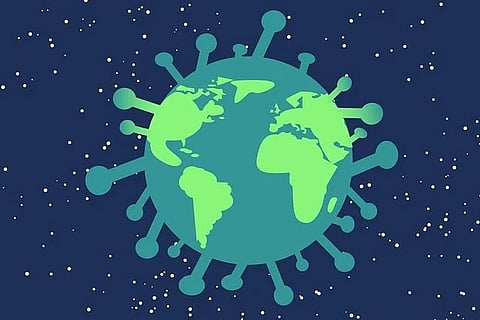

Chennai
“With almost half a year remaining, we will already have used up our quota of the Earth’s biological resources for 2021,” said Susan Aitken, leader of Glasgow City Council, where world leaders will gather later this year for the COP26 climate summit in November. “If we need reminding that we’re in the grip of a climate and ecological emergency, Earth Overshoot Day is it.”
As much of the world was living under coronavirus lockdowns in 2020, last year’s Overshoot Day fell on August 22, nearly a month later than the high of July 25 set in 2018. But this year, even though carbon emissions from air travel and road transport are still lagging 2019 highs, a rallying global economy is pushing emissions and consumption back up.
“Rather than recognise this as a reset moment, governments have been eager to get back to business-as-usual. Global emissions are already creeping back up to pre-pandemic levels,” said Stephanie Feldstein, population and sustainability director at the Center for Biological Diversity (CBD), a US-based environmental group. In an email to DW, she pointed out that even with last year’s shutdowns, greenhouse gases only declined 6.4% in 2020 — a substantial drop representing around twice Japan’s yearly emissions, but not enough to turn things around.
“We missed opportunities when bailout funds were given to major climate polluters, like the aviation and meat industries, without any requirements for a green recovery,” said Feldstein. “And we continue to miss opportunities every day that officials refuse to recognise the climate and extinction crises as emergencies — just like the pandemic.”
Earth Overshoot Day, first created in 2006, aims to calculate the number of days per year that correspond to the necessary biocapacity — the ability of an ecosystem to reestablish its biological resources and absorb waste — to account for civilisation’s ecological footprint. Global Footprint Network (GFN), the research organisation which comes up with the yearly date along with environmental group WWF, compares the calculation to a bank statement tracking income against expenditures. It crunches thousands of UN data points on resources like biologically productive forests, grazing lands, cropland, fishing grounds and urban areas. That tally is then measured against the demand for those natural resources, among them plant-based foods, timber, livestock, fish and the capacity of forests to absorb carbon dioxide emissions. Today, humanity uses about 74% more than what global ecosystems can regenerate; to continue living the way we do now, we’d need the resources of about 1.7 Earths. And that doesn’t look set to change any time soon. CO2 emissions related to energy — particularly fossil fuels like coal — are projected to grow by 4.8% this year over 2020 levels, according to the International Energy Agency.
Feldstein, however, sees some reasons to be optimistic. “The most hopeful signs are coming from communities around the world that are taking the climate crisis seriously, rethinking consumption and growth, and integrating equity and environmental protection into their policies,” she said. Among them are communities looking to tap into the bioeconomy, which aims to swap a “bio-based, or renewables-based, economy for the fossil fuels-based economy” while addressing societal challenges, as outlined in a December 2019 report by the Stockholm Environment Institute (SEI).
Rocio A. Diaz-Chavez, the deputy center director at SEI Africa in Nairobi, Kenya and the report’s author, said making the shift to a bioeconomy can help preserve natural resources for future generations while working to create sustainable industries today. She highlighted regional groups like the UN’s Economic Commission for Latin America and the Caribbean or BioInnovate Africa in Kenya — organisations which are working to promote bioeconomy and sustainable development in their parts of the world.
This article was provided by Deutsche Welle
Visit news.dtnext.in to explore our interactive epaper!
Download the DT Next app for more exciting features!
Click here for iOS
Click here for Android